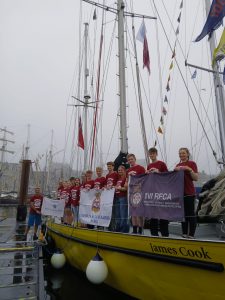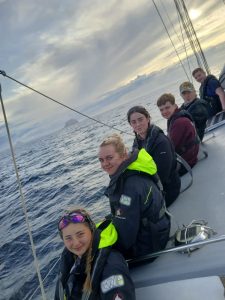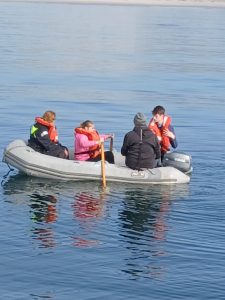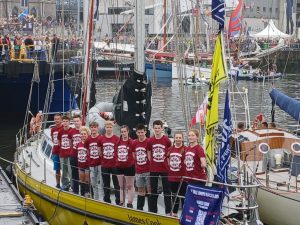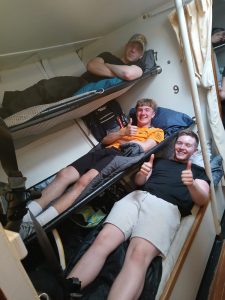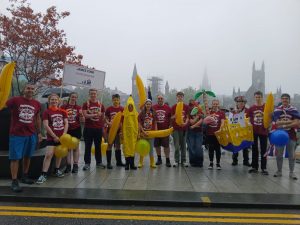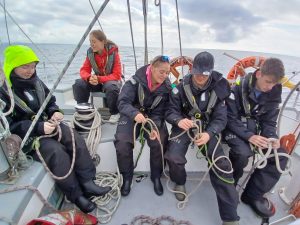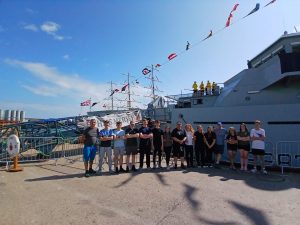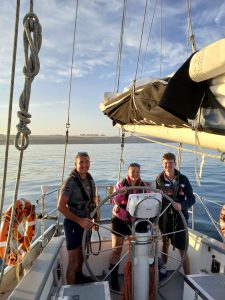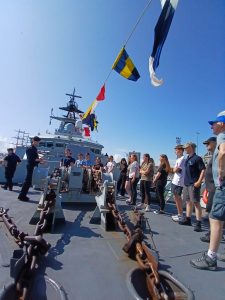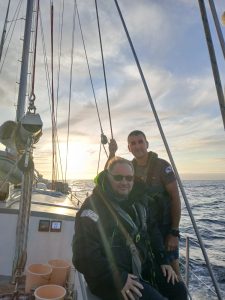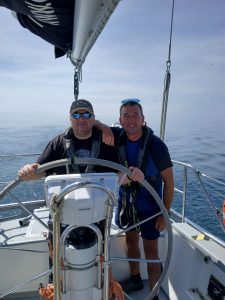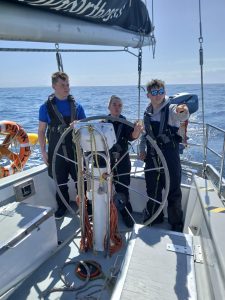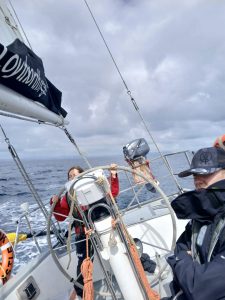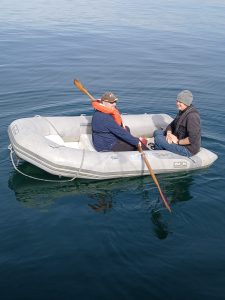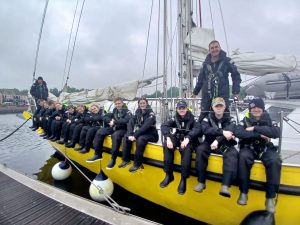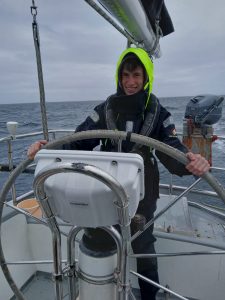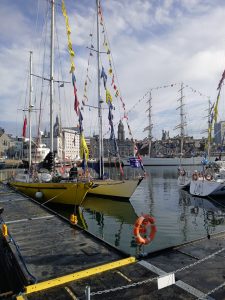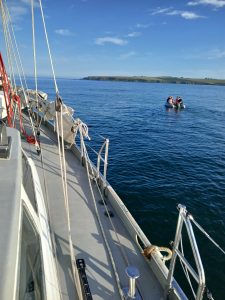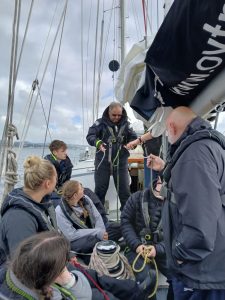“The best thing about being on the boat is meeting new friends and working with them” – Cpl G
From 13th to 21st July 2025, 12 cadets and 2 CFAVs from Cumbria and Lancashire Wing Air Training Corps, Royal Air Force Air Cadets, completed their tall ship sailing expedition. They sailed from North Shields to Aberdeen during which time they were, under supervision, responsible for all aspects of running the vessel including steering under sail and power, preparing to leave/enter port or drop anchor, manually raising/lowering sails, preparing all meals, emergency procedures, and keeping watch. On arrival in Aberdeen, where the Tall Ships Race 2025 was taking place, all 14 participants had achieved the RYA Competent Crew Award.
Background: Ocean Youth Trust North (England), a charity that provides “Adventure under Sail” were taking part in the Tall Ships International Race 2025. Cumbria and Lancashire Wing applied to participate on the delivery leg to Aberdeen, where the race would begin for this year. 12 cadets from across the Cumbria and Lancashire area were selected to take part in the adventure, sailing on the 70-foot 54 tonne steel hulled ketch, the “James Cook”. Ahead of the expedition start, all the participants met up for the day to learn about the expectations of the voyage, what kit to pack, and the challenges they might face. The nature of the voyage means participants will be living and working in close quarters to run the vessel, requiring clear communication and teamwork in a challenging environment. The watch shifts and being at sea means the participants have to have physical and mental resilience, through seasickness, being away from home and interrupted/limited sleep.
Preparation pre-sail: The adventure started in the Royal Quays Marina, North Shields), where the 12 cadets and 2 staff boarded the sailing boat named “James Cook” which belongs to Ocean Youth Trust North (OYT). We were greeted by the skipper; 1st mate and 2 other crew – all volunteers with OYT. The participants were spilt into 3 watches for the week, with a rota pinned to a notice board to show when each watch was: “on duty” for cooking meals, cleaning up, on deck keeping lookout / steering the boat, “on standby” or “off duty”. Each duty during the day lasted 4 hours, and anchor watch at night was 3 hours for each watch. Once split into our 3 watches the crew gave us the safety briefs for the boat which included: the wearing of life jacket on deck, being clipped onto the safety lines at all times, using the gas cooker and oven, fire procedures and muster point, how to safely use the winches and how to hoist the sails using a technique called “sweating and tailing”. Once briefed, the ocean-going waterproof jacket and trousers were issued to each of us. Now we were ready to depart from the marina though the sea lock!
Day 1: All the cadets were given responsible jobs, tying on fenders to protect the side of boat in the lock, or holding onto ropes to pass to the crew to secure to boat once in the lock. We then travelled through the lock and onto the River Tyne, before out onto the North Sea heading North. At this point, the watch rota… and the sea sickness started.
The cadets were now steering the boat and keeping a lookout for any obstructions in the way. The main thing they were looking for is buoys attached by rope which indicates lobster pots – they are a danger to the boat as the rope could get wrapped around the propeller. The standby watch then hoisted the sails with great communication skills, all working as a team, and we were sailing! Co-ordinating all the jobs for the first time was a challenge, with half of the team balancing buckets and their roles as they battled through the sea sickness.
At the end of day 1 we dropped anchor at New Biggin on the sea. All 3 watches embraced the 3hr watch rota, taking three compass bearings from fixed landmarks every 1/2hr to make sure the boat hadn’t drifted. Some of the cadets got to watch a beautiful sunset, moonrise and sunrise over the course of the evening and morning.
“My favourite part is taking the helm and steering the ship on a compass bearing.” – Cpl R.
Day 2: After breakfast, the group once again demonstrated great teamwork to get the boat ready to sail, raising the anchor, and hoisting four of the sails. With good lookouts, the cadets spotted minke whales, which everyone was super excited to see, and later during the day, some seals were also seen. We dropped anchor at Buckhaven for a 2nd night; with the cadets using the skills they learnt from the day before all went smoothly. Then followed 3hr shifts on anchor watch.
“I’m currently keeping lookout, it’s my favourite thing to do. You get to see wildlife, puffins, seals, dolphins, jellyfish. Great! Great fun!” – Sgt S
“My favourite part is the glorious weather we’re having, being able to help on the boat and not be seasick while everyone else is being a bit ill recently.” – with a smile from Cpl F
Day 3: In the morning, we woke to fog and the boat was also surrounded by thousands of moon jellyfish – a very exciting but strange sight. After breakfast, the dinghy was lowered into the water, and all the cadets & staff had the opportunity to row the dingy as part of the RYA Competent Crew course. This was a great success with lots of laughs and finally the end of seasickness was on the horizon. The dinghy was then put back on board, and the anchor was raised. The cadets then had to have a sharpened visual lookout as we were still in fog, with the foghorn sounding every two minutes. Despite the conditions requiring extra concentration, the cadets were still taking the helm, raising the sails, and all working well as a crew. Later that morning, the fog finally lifted, and we had beautiful clear skies and warm sunshine. More minke whales were spotted on both sides of the boat, and everyone was taking pictures and videos, capturing fantastic memories. We travelled to Lanan Bay and dropped anchor for our 3rd night, which followed again with anchor watch on 3hr shifts.
“My favourite thing about being on the boat is when we drop anchor” – Sgt O’C
“My favourite part of the trip so far is seeing the Minke whale in the fog this morning” – Cdt P-D
Day 4: This was our final day sailing! After breakfast, the anchor was raised for the final time of our voyage. We prepared the boat ready to sail, and after three days, we had great communication and everyone fulfilled the roles they had been given with ease. There were lots of sea birds seen and more minke whales, and seals were spotted throughout the day. Upon arrival outside Aberdeen harbour, everyone was thrilled to finally see a pod of dolphins playing and splashing about – a great end to the voyage. We entered the harbour and moored up in the marina surrounded by many other tall ships – a sight to be seen. To the great delight of everyone on board…there was showers available!
Day 5: After breakfast, it was time to show the James Cook some love as she had kept us healthy, well and looked after at sea – the deep clean started! Everyone pulled together to get the job done, despite a lot of tiredness after a challenging week. WO Baines had then arranged for a comprehensive tour of HMS Mersey an offshore patrol vessel, before the cadets visited another youth group on board RONA II for an enjoyable evening exchanging stories of their adventures.
Days 6-8: After all the sailing and cleaning was done, it was time to explore the Tall Ships Race International event within Aberdeen harbour. Cadets had the opportunity to explore Tall Ships from across the world, meet other young people with similar interests, and have a well-earned rest. They also had some cultural experiences, learning Scottish dancing and taking part in a Ceilidh. Day 8 saw the group’s final breakfast before packing up, a debrief session and awarding of RYA Competent Crew Certificates, before the long journey back home.
Summary: The Tall Ships Race 2025 with Ocean Youth Trust North on board the James Cook was a fantastic experience for the cadets and staff who undertook the voyage. The inter-personal skills of participants were developed throughout the week, with everyone needing to communicate clearly and work in a small space. The voyage challenged the cadets to take on responsibility in an environment that is not their norm, and push their comfort zones to achieve more than they may normally have the opportunity to. The trip as a whole required mental and physical resilience from all the participants, especially when faced with seasickness and lack of sleep.
“I thoroughly enjoyed every moment and have gained not only new abilities but also renewed confidence, stronger leadership experience, and memories that will last a lifetime.” – Alan Stewart JP, RAF Veteran and CFAV
“Enter as strangers, leaves as friends” – Quote from the James Cook placard.

